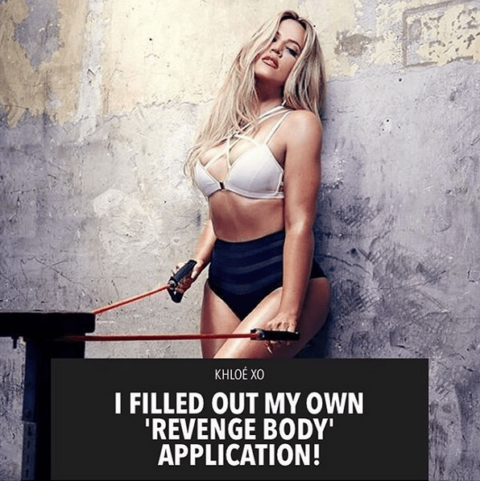Why I’m over Khloé Kardashian’s “revenge body”

This week, Khloé Kardashian announced her millionth foray into the reality show market (Kourtney and Khloé take the Hamptons, Khloé and Lamar, Kocktails with Khloé, etc) with her forthcoming Revenge Body, set to air on E! Network. To get people thinking about applying to be on the show, she filled out the application she set forth for Americans, answering questions that revealed her chubby-kid past, including her youthful aspirations to become a Victoria’s Secret model (she’s happy Kendall got to fulfill that dream, at least).
There’s lots wrong with today’s TV, from The Bachelor to Keeping Up With the Kardashians to The Biggest Loser—yet we love to hate the cringe-worthy moments. But when it comes to body image, we’re wading into dangerous territory, further perpetuating the idea that you must be slim or fit to be successful and adored.
When Khloé started sharing her fierce gym selfies, I was motivated, even inspired, to hit the gym and lift like she does—which is always a positive reaction. Her Kardashian-esque booty was a result of gruelling workouts, so good on her, I thought. But when the whole idea of working out as revenge started circulating after Khloé’s cover with Women’s Health, it got my back up. Sure, it resonated with me. I remember thinking that if I hit the gym more often, then maybe that guy who never called me back would have serious regrets; I ran on the treadmill like it was going out of style, and cranked the resistance on my spin bike. It’s sad and pathetic to think about it now, but that’s just the way things were. And though we’re turning a new leaf in self love—all hail Ashely Graham—we’re still not getting it right. At least not yet.
I spent a couple of years working at a fitness magazine about five years ago, where we would have entire issues dedicated to building your best butt, and the fitness models were ranked based on their supernatural body proportions (BTW, the majority of them chose peanut butter as their favourite “cheat food”). Around that time, I was really hard on my own body, thinking that if my deltoids didn’t pop I was disproportionate, or that my lack of six-pack was because I just wasn’t hitting my rectus abdominus hard enough (who needs one, anyway?). At the time, I was going through a breakup, and going to the gym before 6am was my “me time,” and getting fit was a focus that I thought was healthy. I was so tired and hungry all the time because I worked so hard. But looking back, it was such an extrinsic look at my life that I shudder at how I viewed myself, and others.
The problem with using the gym as your outlet to get back at the people who doubted you is that you start to reward yourself for changes to your physique, which, in the long run, won’t get you a second date, fix your marriage or get you a promotion. Shows like The Biggest Loser, and likely Revenge Body, have many benefits, including turning the lives of those who might become chronically ill (heart disease, diabetes, joint pain) around. But the gasps and applause and OTT weight loss signifies to society that thin is beautiful, thin is healthy and good looks trump everything. I don’t even need to harp on the fact that the body transformation is completely unsustainable when you don’t have a dream team of nutritionists and trainers waiting for you back home.
To be clear, being overweight and sedentary isn’t good for anyone’s health (duh). And yes, we all want to be the strongest, fittest, healthiest versions of ourselves, but let’s shift the focus from doing it for others and doing it because we deserve every minute of it. You’ll walk away from the gym feeling badass, I promise. And if you put a good vibe out there, you’ll attract kind, beautiful people into your world. And they will never make you think about working out for them. So, eff the revenge body.








